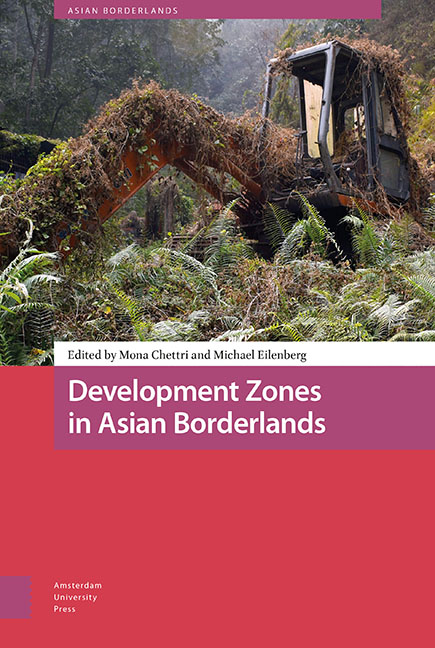Book contents
- Frontmatter
- Contents
- List of Figures and Tables
- Acknowledgements
- Introduction: Enclave Development and Socio-spatial Transformations in Asian Borderlands
- 1 Post-disaster Development Zones and Dry Ports as Geopolitical Infrastructures in Nepal
- 2 Onwards and Upwards: Aerial Development Zones in Nepal
- 3 Casinos as Special Zones: Speculative Development on the Nation’s Edge
- 4 Thinking the Zone: Development, Climate, and Heterodystopia
- 5 From Shangri-La to De facto SEZ: Land Grabs from “Below” in Sikkim, India
- 6 Development Zones in Conflict-Affected Borderlands: The Case of Muse, Northern Shan State, Myanmar
- 7 Smart Enclaves in the Borderland: Digital Obligations in Northeast India
- 8 Post-Disaster Economies at the Margins: Development, Profit, and Insecurities Across Nepal’s Northern Borderlands
- 9 Development from the Margins: Failing Zones and Suspended Development in an Indonesian Border Village
- 10 From Boom to Bust – to Boom Again?: Infrastructural Suspension and the Making of a Development Zone at the China-Laos Borderlands
- 11 Genealogies of Extraction: De Facto Development Zones in the Indonesian Borderlands
- Notes on Contributors
- Index
Introduction: Enclave Development and Socio-spatial Transformations in Asian Borderlands
Published online by Cambridge University Press: 18 June 2021
- Frontmatter
- Contents
- List of Figures and Tables
- Acknowledgements
- Introduction: Enclave Development and Socio-spatial Transformations in Asian Borderlands
- 1 Post-disaster Development Zones and Dry Ports as Geopolitical Infrastructures in Nepal
- 2 Onwards and Upwards: Aerial Development Zones in Nepal
- 3 Casinos as Special Zones: Speculative Development on the Nation’s Edge
- 4 Thinking the Zone: Development, Climate, and Heterodystopia
- 5 From Shangri-La to De facto SEZ: Land Grabs from “Below” in Sikkim, India
- 6 Development Zones in Conflict-Affected Borderlands: The Case of Muse, Northern Shan State, Myanmar
- 7 Smart Enclaves in the Borderland: Digital Obligations in Northeast India
- 8 Post-Disaster Economies at the Margins: Development, Profit, and Insecurities Across Nepal’s Northern Borderlands
- 9 Development from the Margins: Failing Zones and Suspended Development in an Indonesian Border Village
- 10 From Boom to Bust – to Boom Again?: Infrastructural Suspension and the Making of a Development Zone at the China-Laos Borderlands
- 11 Genealogies of Extraction: De Facto Development Zones in the Indonesian Borderlands
- Notes on Contributors
- Index
Summary
Development Zones in Asian Borderlands traces the social, spatial, and economic transformation of Asian borderlands into development zones of capital accumulation, experimentation, and dispossession. While the economic imperative remains central to the origins of development zones, equally important are the individuals, institutions and networks that emerge from them. In turn, these networks and relationships are entangled in cross-cutting and overlapping relationships that create and maintain a development zone. Development Zones therefore encompass the various social, political, and economic networks specific to spatially bound, development-related activity, including Special Economic Zones (SEZs), export processing zones, casinos, and technology enclaves. Development Zones in Asian Borderlands locates a set of common vocabulary to identify and analyse economic zones in borderlands as sites of productivity, development, and politics in the borderlands of South and Southeast Asia.
Borderlands as Productive Spaces
As the chapters in this volume illustrate, development zones are barometers of geopolitical interest and cross-border financial investments, sometimes even despite their stagnation or eventual failure (see Rippa; Hargyono; McDuie-Ra, this volume). Although financial incentives and political networks are important in this changing perception towards borderlands as productive spaces, local factors, like the aspirations, desires, and motivations of people living in these areas are equally important. Borderlands, by virtue of their geopolitical locations, have in the past been sites of reluctant economic investment, especially by the private sector, due to uncertain geopolitical situations and security concerns (Chettri and McDuie-Ra 2018; Eilenberg 2012; van Schendel and Abraham 2005). Simultaneously, they have also been considered areas of strategic state making (Cons 2016; Jones 2012; McDuie-Ra 2016). The desire and need for “development” in areas that have historically been considered remote, out of the way, contributes to the support for the establishment of enclave development in the borderlands as SEZs, including casinos, smart cities, dry ports, and more. Not all borders and borderlands, however, are equal in their historical relevance as sites of refuge, mobility, and cultural exchange or in their contemporary utility as areas of economic productivity. Their relevance waxes and wanes in response to changing socio-political situations. Similarly, development zones of various sizes and functions now proliferate in borderlands. Every development zone is imbued with its own set of aspirations for socio-economic development across different scales and each has its own history of success and failure.
- Type
- Chapter
- Information
- Development Zones in Asian Borderlands , pp. 11 - 32Publisher: Amsterdam University PressPrint publication year: 2021



